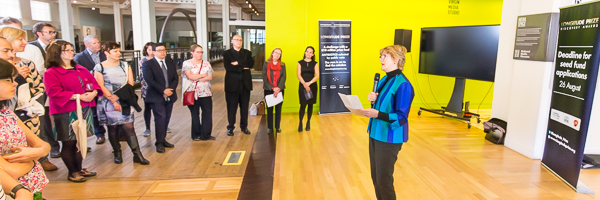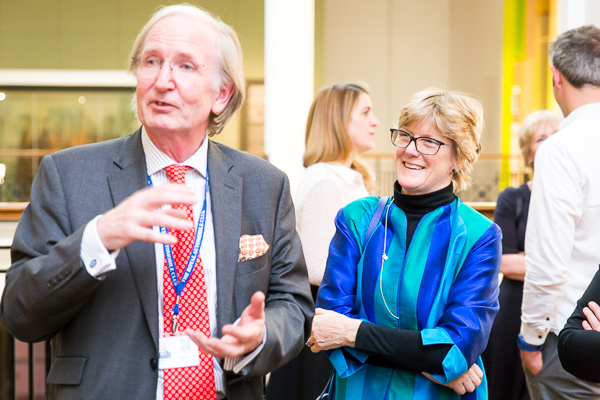Edited speech by Dame Sally Davies, Chief Medical Officer for England, member of the Longitude Committee and co-chair of the Longitude Prize Advisory Panel, on the announcement of the Discovery Awards, seed funding for new diagnostic tests, in the Science Museum.
Antimicrobial resistance is an issue that we are all facing now. If we do not crack this problem, we risk returning to the pre-antibiotic era, when infectious diseases were responsible for around 40% of all deaths. Looking ahead twenty years, we could face a situation where any one of us could go into hospital for minor surgery and die because we get an infection that cannot be treated by antibiotics. Routine operations like hip replacements or organ transplants could become deadly too because of the risk of infection.
This catastrophic threat has come about due to lack of understanding about when to use antibiotics – all too often, antibiotics are used inappropriately in human and animal health, aquaculture, agriculture and in the environment. For example, antibiotics are misused in agriculture, where many farmers will not even know that the feed they buy contains antibiotics, or what the implications of this are.
Globally, they have come to be seen as a wonder drug for many years and people have got in to the habit or prescribing them ‘just in case’. As a result, patients have come to expect an antibiotic for any infection — and put pressure on doctors, and vets, to prescribe them. They can feel that this validates their illness, even though they only fight bacteria, not viruses that are responsible for so many other infections.
Recently, a study found that nearly a third of antibiotics prescribed by doctors in the United States are not needed — this translates to about 47 million unnecessary prescriptions given out each year. The main reason is they are being prescribed for conditions that do not respond to antibiotics, such as colds, sore throats, bronchitis, flu and other viral infections. Only 10% of sore throats benefit from antibiotic treatment, but the prescription rates are commonly as high as 60%. Many antibiotics are thus prescribed unnecessarily.
This has spurred the evolution of resistant bacteria, which was tolerable in the 60s, 70s and 80s when pharma companies were finding and developing lots of antimicrobial drugs. But now the ‘low hanging fruit’ has been taken and R&D has become much more difficult, meaning we cannot just open the medicine cabinet to get out the next antibiotic when resistance develops.
We are now seeing infections which have multi-drug resistance — resistance to more than one of the antibiotics that doctors would normally prescribe. We are also starting to see extreme drug resistance, where the infection is resistance to all of the drugs that we have. We are seeing cases of this when it comes to tuberculosis in London, right now.
There is much we can do in terms of prevention and that means basic sanitation and hygiene and a greater use of vaccines in humans and animals. There is much we can do to control misuse of these precious drugs too. Globally, guidelines on the use of antibiotics are not implemented and the absence of regulation in many countries means that as many as 50% of antibiotics are dispensed without a prescription.
However, it is not all about restricting access to antibiotics. At the moment, more people die of lack of access to antimicrobials, not because of resistant infections. Moreover, by one estimate, 25% of all counterfeit drugs are antibiotics.
Any solution needs to ensure the appropriate use of antibiotics and rapid diagnostics – the aim of the new Longitude Prize – will help immensely with this. What we desperately need is quick, effective diagnostics, which can be used in any setting to determine, at the most basic level, if an infection is bacterial or viral.
Even better would be for the diagnostic to provide information on which drug would be most effective – but I will take the simple bacterial/viral diagnostic at this point. That is why I first suggested antimicrobial resistance, or AMR, and the development of a rapid diagnostic, should be the subject of the Longitude Prize.
The important contribution of rapid diagnostics in the fight against AMR has also been recognised by Lord O’Neill in his independent international review on antimicrobial resistance. He will be publishing his final report later this week, and rapid diagnostics will form a key part of his recommendations.
Point of care diagnostics, as being searched for by the Longitude Prize, have a key role to improve the stewardship of existing and new drugs, and to challenge, and help influence, some of the bad behaviours through providing an evidence base for decision making by health workers and patients.
For all of these reasons, it gives me great pleasure to be here tonight at the Science Museum, near the Clockmakers’ Museum where we can see the fifth marine chronometer of John Harrison, who cracked the original Longitude challenge, to launch and open the Discovery Awards for applications.
These are seed funds, open to existing and new teams registered on the Longitude Prize website, to help maximise the number and diversity of entrants to the Prize. These small sums will help teams who are hitting barriers that they cannot overcome with traditional funding – they are new to the field, unpublished, working on novel ideas, at very early stages of ideation, not able to access labs to carry out first stage testing and so on.
We also know that many teams with novel ideas are also working in new collaborations or for other reasons cannot access funding so this will help them come forward and register. The current pot for the prize is £200,000, for which we thank GSK and BIRAC for their support.
But we also hope to find more to add to this, so please talk to Nesta, the innovation foundation that runs the £10 million challenge prize, if you have ideas of individuals or organisations who may want to join GSK and BIRAC as partners. If we do not take action, we could be back in the 19th century where infections kill us as a result of routine operations.

